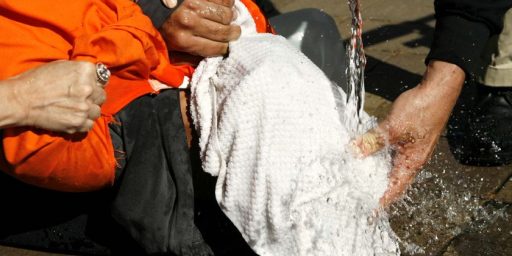Torture Test
Thoreau offers a riposte to the “Is waterboarding torture” question that’s evocative of his Unqualified Offerings co-blogger Jim Henley‘s longago response to a similarly silly question on the subject by Alan Derschowitz.
Commenter Tony T, though, actually comes up with a perfectly sensible test: “Would you call it ‘torture’ if Iranians were doing it to a captured American pilot?”






Gee, what would we call it if it prevented an Islamic terrorist from slowly sawing off the head of a westerner?
The proposed test made me think (which is hopefully the purpose of these posts). I would add some additional thoughts.
Would you approve of a police officer using a taser in accordance with that police department’s guideline? If so, would you approve of a private citizen using a taser in accordance with that private citizen’s guideline?
Most, but not all, would approve of the first. They might question the guidelines, whether the facts met the guideline, etc. but they would not have a problem with it. But many people wouldn’t be comfortable to let a private citizen set their own guideline and use the taser? Why, because the private citizen guideline may be “anyone who is ahead of me in line at the grocery store gets zapped”. There would also be the question of changing guidelines, accountability for the guideline, citizen input directly or indirectly through elected officials into the guideline, etc. In short, the public gives the police a greater latitude in what they would allow because they (are supposed to be) held accountable through our elected officials.
So to say that Iran and the US have the same amount of legitimacy and thus should have equal rights to act in the same manner may not be appropriate. To put it another way, Zimbabwe and the US have both taken private property over the last several years. But I would support an armed revolt against the government in Zimbabwe but not in the US. Both actions are the same and ostensibly for the greater good of each country. But in my view, Zimbabwe has lost its claim of legitimacy.
So before you can ask the question on Iran vs the USA, you have to ask about the right to capture, hold and interrogate the subject. The fact that the mechanical actions are the same does not mean that the legitimacy for performing those actions are the same.
Christopher asks “what would we call it if it prevented an Islamic terrorist from slowly sawing off the head of a westerner”
Answer: A dime store novel.
Didn’t you’re mother teach you “Two wrongs don’t make a right”? How about “you can tell a person by the company they keep” ?
The fact remains waterboarding was tool of the Khmer Rouge, the Stasi, and the Nazis but was not, until recently, considered a legitimate by Americans.
Which also directly shows that yetanotherjohn has got it exactly backwards: the USA now has less legitimacy _because_ we torture.
Contrary to what you see on “24”, physical torture is NOT for extracting information. What physical torture is good for is extracting compliance — that’s why communist regimes were so good at it. Think of Orwell’s 1984: The Party did bother to extract any information from Winston; the only wanted his compliance. So they tortured him. Worse, one can’t trust information gained through torture because one must independently assess if the information is accurate or fabricated for the sole purpose of making the pain end.
So, if our intentions are pure, and God is on our side, we can pretty much do what we want, right?
How about this:
If you’re wondering whether something’s torture, it is.
“If you’re wondering whether something’s torture, it is.â€
So fat ladies clogging up the isle, listening to a boring teacher, rap music, having to put up with liberals, etc is torture?
They may seem like torture and one may wonder if they are torture but it is not the same as true torture.
If Iran caught a U.S. spy and thought he planted a WMD, would I expect them to use harsh interrogation techniques? Yes. If we caught a down pilot from Iran would we use the same harsh interrogations as Iran would on our pilots? No. Should we use harsh interrogations on a terrorist who planted a WMD in U.S? Yes.
The U.S. in general is much more humane than others in its treatment of others in a great deal of situations. Are there times when we must get nasty? Yes, but it isn’t a general policy nor should it be completely abolish.
Wayne – so can we torture the terrorist’s children to find out where the WMD are?
Thaht depends on what your and their definition of wrong is,
and can you ever. Fighting for the rights of terrorist makes you a what?
and what do we call ripping into the head of an unborn baby human and sucking its brains out?
just hope you don’t believe in this right too, and try to worry me about my stand on the human rights of a terrorist.
witch leads me back to this:
legitimacy only means so much when your in a fight to the death an enemy who will follow no rules, so you worry about what the rest think and i’ll worry about us.
A major problem with that logic is that there hasn’t been a case of someone planting a WMD and the US therefore trying to torture the location out of them under the infamous “ticking time bomb” scenario that everyone is so fond of quoting.
Instead, we have used these techniques as a substitute for real intelligence gathering and there is not, to date, any empirical evidence to suggest that these techniques have done us any good. We have been told that they have been useful, but the people telling us that have a vested interest in having us believe that the techniques have been efficacious.
This administration has reserved to right to use whatever techniques it finds necessary against any individual that it deems to be a “terrorist”–and in that way, we fail the “Iran Test” suggested above.
Oh good lord. Why are you such a frightened little child?
“we fail the “Iran Test” suggested above.â€
I don’t recall us torturing any Iran Pilot so how could we fail the above “Iran testâ€.
The TTB scenario is not meant to be the only scenario for use of HI “harsh interrogationâ€. However it identifies those who won’t even admit there are times to use HI. Therefore it is of no use to discuss with them when HI could be used since they have blinders on.
Would I torture a terrorist’s child to save my and many others children? Only if it is the only way to save them and I would feel extremely bad for doing it. So are you saying you would let your child and others be murder.
Granted not everyone can make tough decisions. So if you don’t answer I understand, but don’t condemn me unless you are willing to make the tough decisions.
Wayne,
The “Iran Test” being:
You throw in the WMD issue and the ticking timebomb, but that is a distraction.
I can just see the Iranian president’s mocking speech: “torture? but don’t your own pilots submit to this voluntarily in their training?”
The right-wing torture chorus has provided him all the justifications he needs. Verily, they already have their reward.
I’ll never be frigtenend of terorists or their liberal symathizers, but I do worry about what they do and how the do to others.
Does anyone have any evidence that torture, (or, if you prefer, “stress techniques used by Communists and Nazis”), are actually useful for eliciting information from uncooperative captives?
Anyone? Ferris?
Conservatives are essentially making the same argument nazis made in order to justify torture.
Conservatives cannot be reasoned with, so don’t bother.
Interesting to note that in right wing wet dreams we are already at war with Iran…
There is a great deal of evidence that torture works including statements from professional.
http://www.channel4.com/news/articles/world/mi5s%20torture%20statement/111865
If it didn’t work, do you think very many Intel and law enforcement agency would use it.
As I have stated what someone would refer to as torture and what one considered torture is two different deals. A shot down pilot is expected to be treated a certain way. If he is not then many would refer to it as torture. However the same acts against a criminal or spy would not be considered torture.
For example putting a pilot on trial for murder would not be considered the same as putting a criminal on trial for murder.
Morality… what is moral and immoral is invariably decided by the victors. So, tell me, what happens to the morality when we lose?
Well, in this case, absolutely nothing. Does anyone actually drive to work each day believing that were it not for waterboarding, our way of life would seriously be threatened?
Our greatness and power come from our society and our culture, not from our waterboards.
Tony T, though, actually comes up with a perfectly sensible test: “Would you call it ‘torture’ if Iranians were doing it to a captured American pilot?â€
No! that is not a perfectly sensible test. Would you call it torture if Iranians were doing it to a captured CIA asset suspected of participating in or planning terrorist attacks on Iranians.
May I suggest that what we should be avoiding above all else is allowing any single man at any point in the chain of command — from a low-level interrogator to the President — to decide BY HIMSELF that torture, or something close to torture, is permissible for any individual prisoner?
What we need, I think, is a Permissible Torture Court — and we had better call it that, rather than falling back on more of those cute little euphemisms we’re all so drearily familiar with by now — similar to the FISA Court, in which a large supermajority of judges would be required to allow torture or near-torture in those rare emergency cases in which it might be justified.
Let us take this to the extreme and call all forms of interrogation whatsoever to be torture. Mental pain and physical pain by exposure to any questions at all, not to leave out water boarding, etc. etc..
Then let us forbid all forms of torture by law and with severe punishments for any interrogation at all.
If you buy into this, you are really shutting down intelligence gathering from interrogations of prisoners.
Is this sensible? Not in my opinion, it isn’t. So where in the spectrum of interrogation techniques do you allow it to go forward, and where do you stop it? No one seems willing to take a crack at a comprehensive list of what each technique is, whether it is permissible, and under what circumstances. Much easier to argue for or against one specific technique, or let us ban all interrogations, which is patently stupid.
Without definitions and rules, the interrogators have few guidelines at all, except that there is some kind of limit, and no one can tell them how to discover it, or what will really happen if they exceed the limit, but also succeed in getting vital information out of the target. Or not.
Short of an agreed set of interrogation techniques, definitions, circumstances of use, and rules this entire argument is fatuous, and interrogators will continue to do what they think they have to do on the spot.
Who will step up and provide such a list and rules?
I suggest to some posters that they have never been subjected to real torture, and do not know their own limits of resistance. They might be very chagrined to find out that they are blabbing everything they know within a few minutes or so.